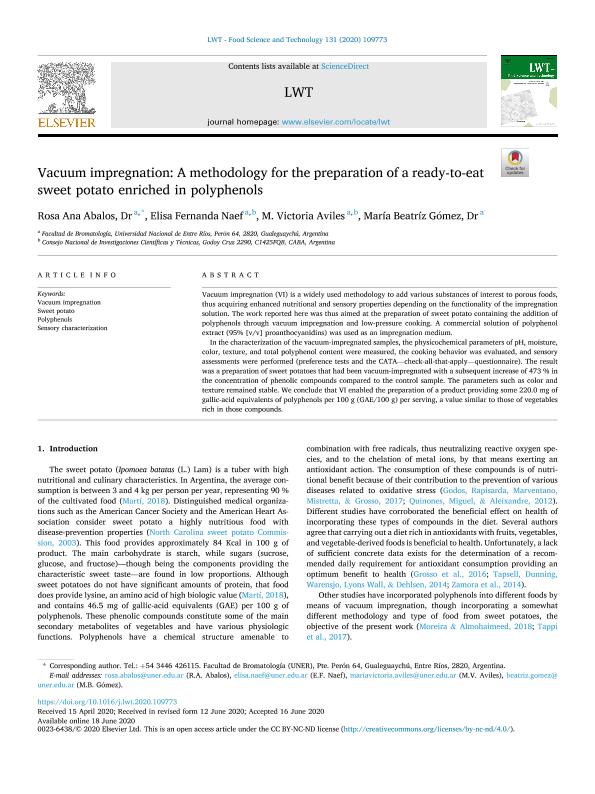Mostrar el registro sencillo del ítem
dc.contributor.author
Abalos, Rosa Ana

dc.contributor.author
Naef, Elisa Fernanda

dc.contributor.author
Aviles, Maria Victoria

dc.contributor.author
Gomez, Maria Beatriz

dc.date.available
2023-01-23T14:41:49Z
dc.date.issued
2020-09
dc.identifier.citation
Abalos, Rosa Ana; Naef, Elisa Fernanda; Aviles, Maria Victoria; Gomez, Maria Beatriz; Vacuum impregnation: A methodology for the preparation of a ready-to-eat sweet potato enriched in polyphenols; Elsevier Science; LWT - Food Science and Technology; 131; 9-2020; 1-7
dc.identifier.issn
0023-6438
dc.identifier.uri
http://hdl.handle.net/11336/185274
dc.description.abstract
Vacuum impregnation (VI) is a widely used methodology to add various substances of interest to porous foods, thus acquiring enhanced nutritional and sensory properties depending on the functionality of the impregnation solution. The work reported here was thus aimed at the preparation of sweet potato containing the addition of polyphenols through vacuum impregnation and low-pressure cooking. A commercial solution of polyphenol extract (95% [v/v] proanthocyanidins) was used as an impregnation medium. In the characterization of the vacuum-impregnated samples, the physicochemical parameters of pH, moisture, color, texture, and total polyphenol content were measured, the cooking behavior was evaluated, and sensory assessments were performed (preference tests and the CATA—check-all-that-apply—questionnaire). The result was a preparation of sweet potatoes that had been vacuum-impregnated with a subsequent increase of 473 % in the concentration of phenolic compounds compared to the control sample. The parameters such as color and texture remained stable. We conclude that VI enabled the preparation of a product providing some 220.0 mg of gallic-acid equivalents of polyphenols per 100 g (GAE/100 g) per serving, a value similar to those of vegetables rich in those compounds.
dc.format
application/pdf
dc.language.iso
eng
dc.publisher
Elsevier Science

dc.rights
info:eu-repo/semantics/openAccess
dc.rights.uri
https://creativecommons.org/licenses/by-nc-nd/2.5/ar/
dc.subject
POLYPHENOLS
dc.subject
SENSORY CHARACTERIZATION
dc.subject
SWEET POTATO
dc.subject
VACUUM IMPREGNATION
dc.subject.classification
Alimentos y Bebidas

dc.subject.classification
Otras Ingenierías y Tecnologías

dc.subject.classification
INGENIERÍAS Y TECNOLOGÍAS

dc.title
Vacuum impregnation: A methodology for the preparation of a ready-to-eat sweet potato enriched in polyphenols
dc.type
info:eu-repo/semantics/article
dc.type
info:ar-repo/semantics/artículo
dc.type
info:eu-repo/semantics/publishedVersion
dc.date.updated
2023-01-23T00:38:06Z
dc.journal.volume
131
dc.journal.pagination
1-7
dc.journal.pais
Países Bajos

dc.journal.ciudad
Amsterdam
dc.description.fil
Fil: Abalos, Rosa Ana. Universidad Nacional de Entre Ríos. Facultad de Bromatología; Argentina
dc.description.fil
Fil: Naef, Elisa Fernanda. Consejo Nacional de Investigaciones Cientificas y Tecnicas. Centro Cientifico Tecnologico Conicet - Santa Fe. Instituto de Ciencia y Tecnologia de Los Alimentos de Entre Rios. - Universidad Nacional de Entre Rios. Instituto de Ciencia y Tecnologia de Los Alimentos de Entre Rios.; Argentina. Universidad Nacional de Entre Ríos. Facultad de Bromatología; Argentina
dc.description.fil
Fil: Aviles, Maria Victoria. Consejo Nacional de Investigaciones Científicas y Técnicas; Argentina. Universidad Nacional de Entre Ríos. Facultad de Bromatología; Argentina
dc.description.fil
Fil: Gomez, Maria Beatriz. Universidad Nacional de Entre Ríos. Facultad de Bromatología; Argentina
dc.journal.title
LWT - Food Science and Technology

dc.relation.alternativeid
info:eu-repo/semantics/altIdentifier/url/https://linkinghub.elsevier.com/retrieve/pii/S0023643820307623
dc.relation.alternativeid
info:eu-repo/semantics/altIdentifier/doi/http://dx.doi.org/10.1016/j.lwt.2020.109773
Archivos asociados
